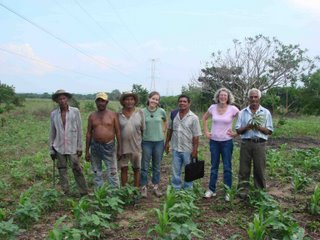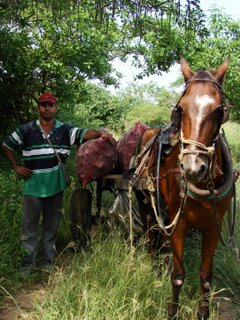The Right to Land

When folks are displaced, in Colombia and elsewhere in the world, they lose not only their homes, but also their histories, communities, neighbors, and, for many, their livelihoods. For farming families, the transition to city life after displacement can lead to increased poverty when they can no longer grow food to sell and eat.
The Colombian Constitution guarantees land to the displaced, and a group of families in Barranquilla meets regularly at the Presbytery office to plan their petition for new land. Some of these families have been displaced over and over again throughout the decades, by violence and political pressure, and their process of understanding the law and mobilizing for their rights is fascinating to watch.

While waiting for their petition to be recognized and fulfilled (which we imagine will take quite some time, given the corruption, bureaucracy, and governmental obstinacy they’re facing), several men have banded together to farm a small plot of land outside of the municipality of Soledad.

Last week they invited us to visit the finca (farm), to witness their hard work and to document their struggle for land. They specifically asked us to take photos and to share their story, to spread the word that these families who seek land from the government are not exploiting the system or looking for a free ride. Rather, they told us, “We are dedicated and hardworking. We are farmers. We deserve land.”

The finca currently sits on two hectares and is shared by eight families. They cleared the land by hand, which left a landscape of weeds, uneven soil, and debris such as rocks and trees – quite a difference from the sleek agri-business farms of the U.S. Midwest! The men have planted mixed rows of corn and beans, and while they wait for their first yield, they’re making carbon (charcoal) from the wood cleared from the land. The carbon will sell for 4500 pesos per bag, less than $2.00 US.

Currently, the men are torn between their obligations to their families and the work demanded by the finca. Although we drove over the bumpy, dirt road between Soledad and the finca in a rickety old jeep, we realized that these men must walk this distance (at least three or four kilometers) every day. This creates an obstacle for those who have children to support through other work.
Nevertheless, despite these challenges, the men greeted our visit with enthusiasm and openness. They’re already planning to diversify the crops during the next planting to include yucca and papas (although seeds are expensive and hard to come by). They’re proud to share their land and their struggles with us and, most of all, they’re hopeful about the possibility of returning to their livelihoods.
For more photos of the finca, click here.

0 Comments:
Post a Comment
<< Home